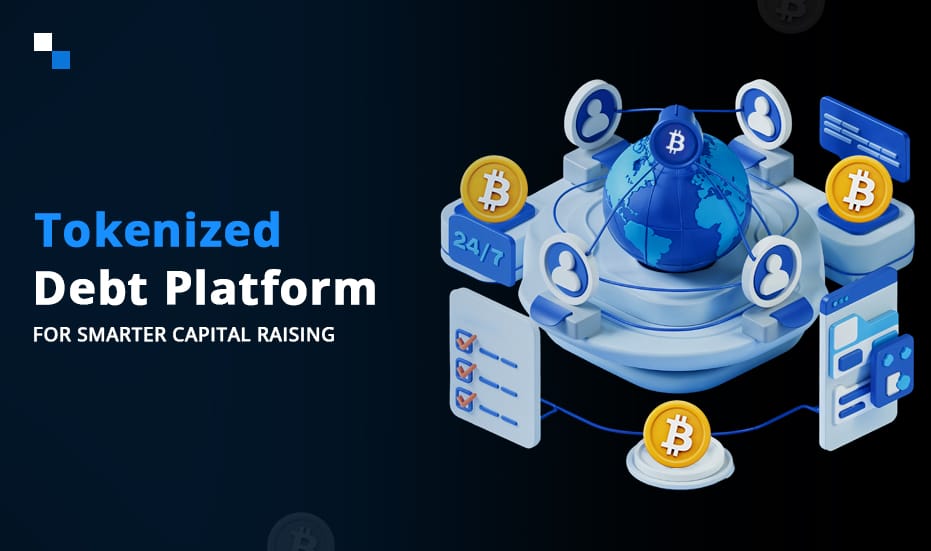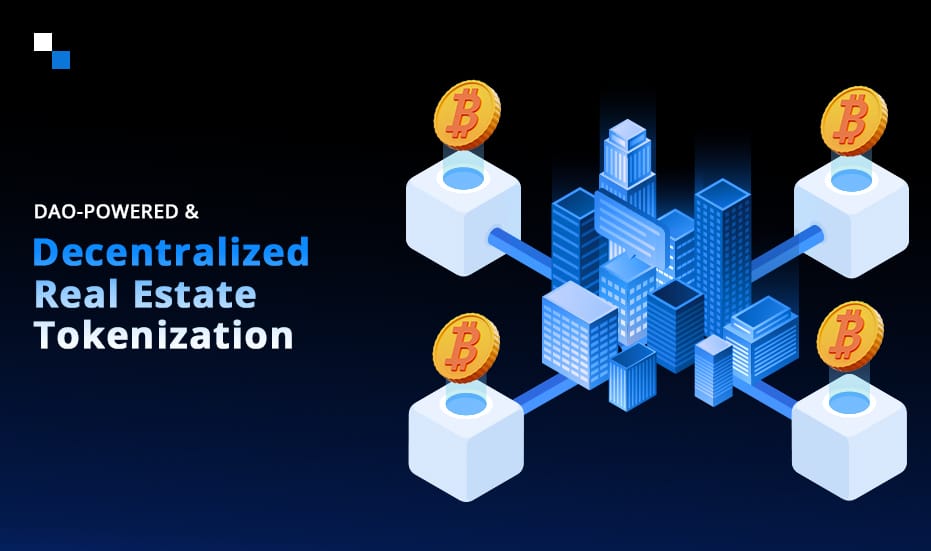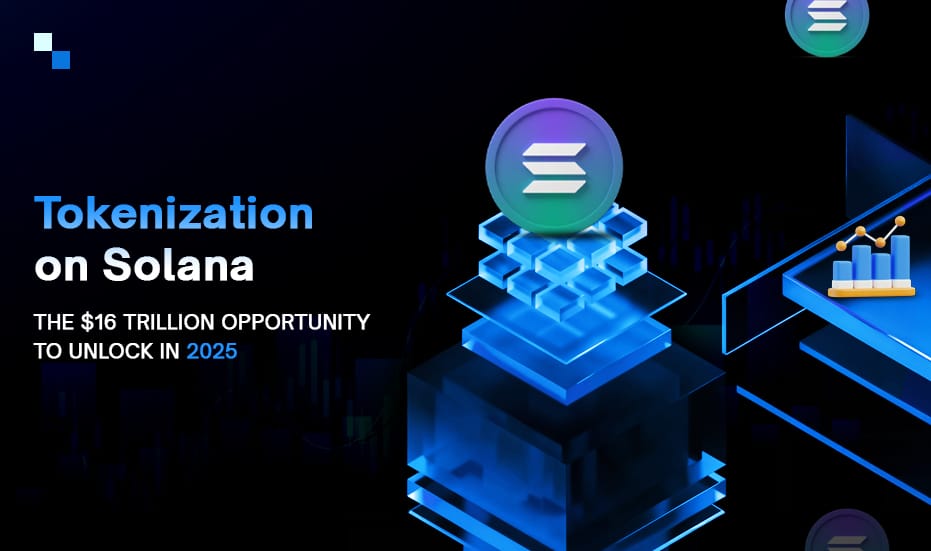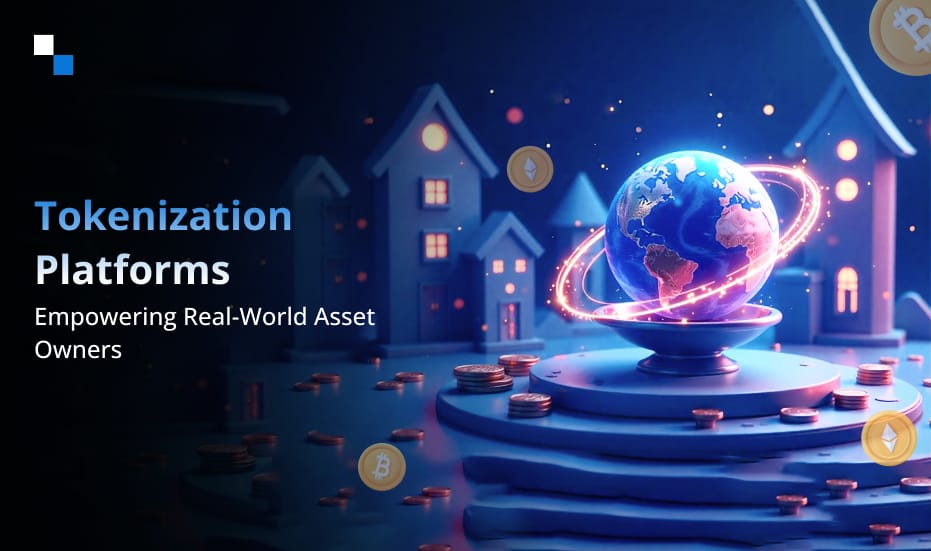
How to Craft a Metaverse Platform for Education to Upgrade Exam Evaluation
February 14, 2025
Top ICO Development Companies 2025: Best Blockchain Token Launch Experts
February 14, 2025Tokenized debt modernizes traditional debt operations by offering global access to capital and liquidity in Debt Financing. With the Tokenized Debt Platform, instruments (such as bonds and loans) become accessible to worldwide investors with higher security standards, faster, lower fees, and reduced compliance risks. While companies like real estate and fintech can quickly raise capital, Tokenized debt unlocks access to a broader range of financing assets offering security, transparency, and ease of use- all in one streamlined, transparent, and compliant Blockchain ecosystem.
Read on to know more about Tokenized debt, and how enterprises can leverage the platform to convert their traditional debt instruments into digital tokens for broader market reach.
Understanding Tokenized Debt
Tokenized Debts are the digital representation of traditional debt such as bonds, loans, or mortgages in the form of tokens. These tokens can be fractionalized, traded, and settled on a blockchain. So, instead of having a physical paper certificate, ownership is represented by digital tokens that signify the share of the debt.
Types of Debt That Can Be Tokenized
Tokenized debt platforms are versatile and can support a wide range of debt instruments. Here are some of the most common types of debt that can benefit from tokenization:
- Corporate Bonds: Financial Institutions can leverage the Tokenized Corporate bonds to raise capital from a global pool of investors while offering fractional ownership and increased liquidity.
- Government Securities: Tokenization of sovereign debt can streamline issuance processes, reduce costs, and attract a broader investor base.
- Municipal Bonds: Local governments can leverage tokenized debt platforms to fund infrastructure projects and other public initiatives.
- Mortgage-Backed Securities: Tokenization of Real estate loans and mortgages can allow global investors to participate in real estate financing without owning physical property.
- Consumer Loans: Tokenizing personal loans, auto loans, and credit card debt can unlock new investment opportunities for bank and fintech firms.
How Tokenized Debt is Creating New Opportunities for Investment?
By bridging traditional finance with Blockchain through Tokenized debt platforms, issues and investors can unlock the myriads of new investment opportunities, such as:
1. Liquidity
Traditional debt markets are illiquid and have limited opportunities for secondary trading. Tokenized debt platforms enable fractional ownership with continuous trading, making it easier for investors to buy and sell debt instruments.
2. Fractional Ownership
Through tokenization, fractional ownership allows investors to invest with small amounts of capital. This democratizes access to debt markets, thus allowing retail investors to expand their index on institutional-grade assets.
3. Global Access
As tokenized debts are recorded on the blockchain, issuers can reach out to a global audience of investors, especially the emerging markets where access to capital has always been limited.
4. Lower Cost
Tokenization can drastically reduce the transaction costs of the issuance and post-issuance processes by effectively removing intermediaries.
5. Enhanced Transparency
With every transaction permanently stored in a transparent ledger on the blockchain, all relevant parties can view the status. This reduces the risk of fraud while increasing the trust assurance.
6. Faster Settlement Times
Unlike traditional systems, blockchain platforms allow settlements in minutes, not days.
The Role of Smart Contracts in Tokenized Debt
Smart contracts are self-executing agreements that contain the “terms and conditions” of tokenized debt such as coupon rate, maturity date, and payment schedule. By automating the transactions through smart contracts on Tokenized Debt platform, Asset management companies can eliminate intermediaries, and decrease transaction costs. It defines how the debt is managed and executed on a blockchain. Through smart contracts, issuers can automate the following processes for their Tokenized debt:
- Interest Payments: Smart contracts can automatically distribute interest payments to token holders based on predefined terms.
- Principal Repayments: The repayment of principal amounts can be automated, ensuring timely and accurate transactions.
- Compliance Checks: Smart contracts can enforce regulatory requirements, such as KYC (Know Your Customer) and AML (Anti-Money Laundering), ensuring that only eligible investors can participate.

Real-World Examples of Tokenized Debt Platforms
Tokenized debt is already being adopted by leading financial institutions and fintech companies worldwide. Here are some notable examples:
- Tokenized Government Securities: Several institutions have successfully tokenized government securities, demonstrating the potential for blockchain to streamline debt issuance and management.
Singapore’s BondEvalue offers fractional ownership of sovereign bonds to retail investors in regulated markets.
- Tokenized Real Estate Loans: Platforms have emerged that tokenize real estate loans, enabling investors to participate in real estate financing with fractional ownership.
Goldman Sachs launched its Digital Asset Platform (GS DAP), which facilitated a $102 million digital Green Bond in collaboration with the Hong Kong Monetary Authority (HKMA) and the Hong Kong government.
- Tokenized Corporate Bonds: Companies have issued tokenized bonds to raise capital from a global investor base, showcasing the versatility of tokenized debt platforms.
Taurus collaborated with SCCF and Horizon Capital AG to tokenize private debt securities in the form of a ledger-based note, using the CMTAT smart contract framework.
The Future of Tokenized Debt
The future of Tokenized debt looks promising as many trends going to drive its mass adoption:
- DeFi Integration: Tokenized debt solutions will enable DeFi service providers to offer peer-to-peer lending and borrowing.
- New Asset Classes: With Tokenization Debt Platform Development, Banks and Fintech Startups will be able to incorporate new asset classes like Sustainable Financing Instruments, SVG bonds, and Green Bonds.
- Regulatory Advancements: With stable regulatory frameworks for Tokenized Debt worldwide, we can expect more institutional investors to enter the RWA market.
- AI and Analytics: Advanced analytics and AI will be integrated into the Debt Tokenized Platform to offer real-time insights related to market trends and investor behavior.
Want to build a Tokenized Debt Platform?
The first step is to collaborate with an experienced Tokenized Platform Development company to create a strategic approach for tokenization. Following is the step-by-step guide to help to move further with the development process.
- Define Use Case: Determine your target market and the precise financial instruments you wish to tokenize, such as corporate bonds and real estate loans.
- Choose Blockchain: Select a blockchain network, like Ethereum, Polygon, or a private blockchain, that satisfies the needs of your platform.
- Create Smart Contracts: Built safe and compliant smart contracts for debt issuance, and administration in collaboration with Tokenization Platform Development Company.
- Assure Regulatory Compliance: To negotiate the regulatory environment and include compliance procedures into your platform, collaborate with legal professionals.
- Create an Easy-to-Use Interface: Create a platform that is easy to use and offers investors and issuers a smooth experience.
- Test and Launch: Before launching, carry out thorough testing to guarantee the platform’s functionality and security.
Your Vision, Our Expertise: Build Customer Tokenized Platform with Antier
Choose Antier as your trusted partner for developing a tokenized debt platform development. Our tailored solutions combine seamless smart contract integration with robust regulatory compliance, ensuring your platform is secure and scalable.
Let us help you modernize your debt offerings by merging the stability of traditional finance with the innovation of blockchain technology. Together, we can transform the future of debt financing and unlock new opportunities.
Ready to take the next step? Let’s collaborate!



